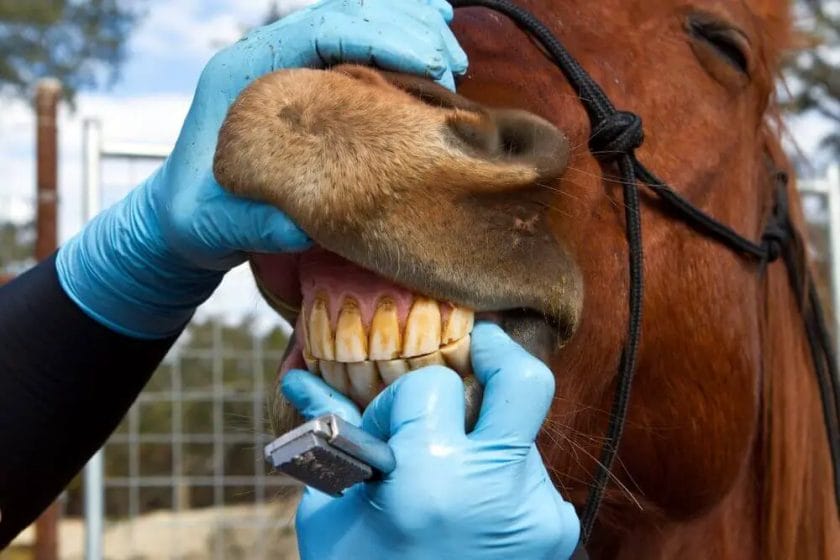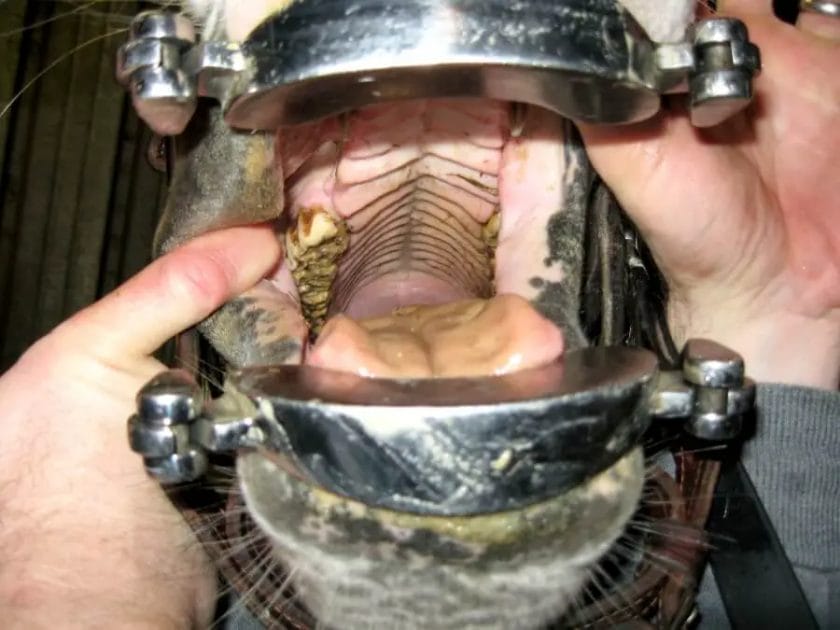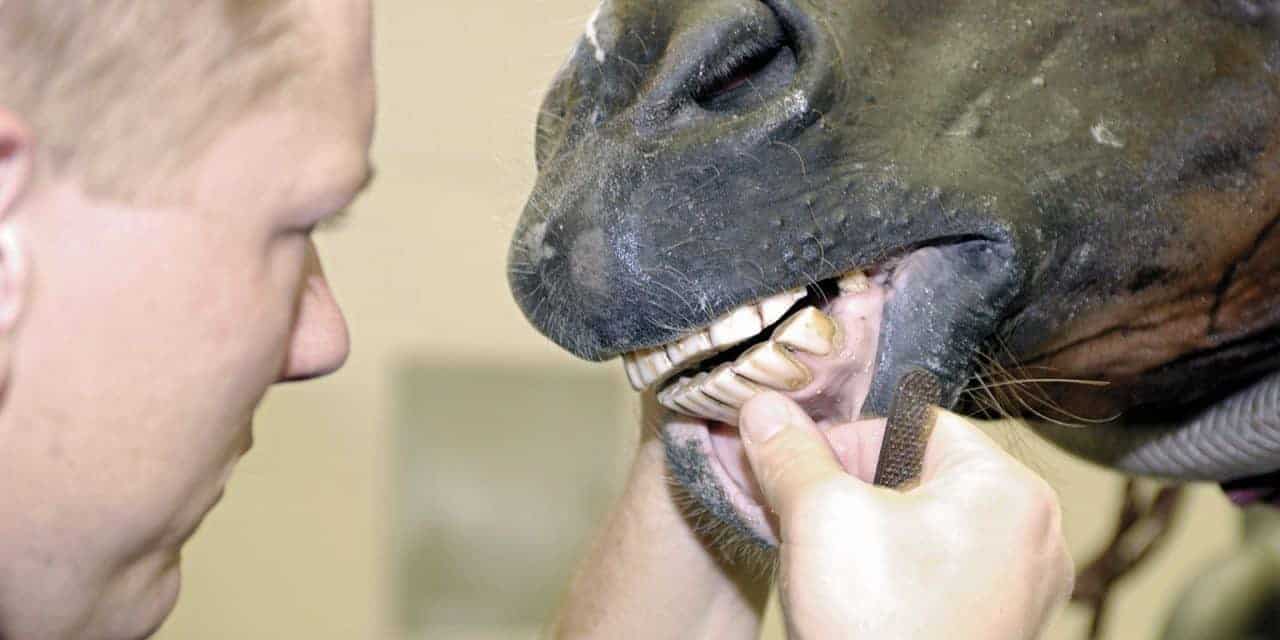Horse teeth floating is a common dental procedure that ensures the horse’s teeth are properly aligned and enables them to chew and eat efficiently. The cost of teeth floating can vary depending on several factors such as the location, the veterinarian or equine dentist performing the procedure, and the horse’s specific dental needs. Typically, it can range from $100 to $300 per horse. Regular dental care is essential to maintain the horse’s overall health and prevent dental issues.

Factors that affect the cost of teeth floating in horses
Teeth floating is an important dental procedure for horses that involves smoothing and removing sharp points from their teeth. This procedure helps ensure that the horse’s mouth is comfortable and allows for proper chewing and digestion. However, the cost of teeth floating can vary depending on several factors. In this section, we will discuss the factors that can affect the cost of teeth floating in horses.
1. Age of the horse
The age of the horse is a significant factor in determining the cost of teeth floating. Young horses typically have softer teeth, which require less time and effort to float. On the other hand, older horses may have more extensive dental issues, such as uneven wear or dental abnormalities, which can increase the time and complexity of the procedure. As a result, the cost of teeth floating for older horses is generally higher.
2. Dental condition
The dental condition of the horse plays a significant role in determining the cost of teeth floating. Horses with minor dental issues, such as sharp points or small ramps, may only require a basic floating procedure, which is relatively less expensive. However, horses with severe dental problems, such as missing or broken teeth, malocclusions, or periodontal disease, may require additional treatments or specialized procedures, resulting in higher costs.
3. Geographic location
The geographic location of the equine dental practitioner can also influence the cost of teeth floating. The cost of veterinary services can vary from one region to another, depending on factors such as local competition, cost of living, and overhead expenses. In areas with a high cost of living or limited access to equine dental specialists, the cost of teeth floating may be higher compared to areas with more competitive pricing.
4. Additional sedation or anesthesia
In some cases, horses may require sedation or general anesthesia for teeth floating. This can be necessary for horses that are uncooperative or have extensive dental issues that require more invasive procedures. The use of sedation or anesthesia adds an additional cost to the teeth floating procedure due to the need for specialized equipment, medications, and monitoring.
5. Professional experience and credentials
The professional experience and credentials of the equine dental practitioner can also impact the cost of teeth floating. Experienced and highly skilled practitioners may charge higher fees for their expertise and reputation. Additionally, practitioners with advanced certifications or specialized training in equine dentistry may also have higher fees due to their specialized knowledge and skill set.
6. Travel expenses
For mobile equine dental practitioners who travel to the horse’s location, travel expenses can be a factor in the overall cost of teeth floating. If the practitioner has to travel long distances or incur additional costs such as fuel or lodging, these expenses may be factored into the final cost of the procedure.
7. Number of horses
If multiple horses on a farm or facility require teeth floating, some equine dental practitioners offer discounted rates for bulk services. The cost per horse may be lower when multiple horses are scheduled for teeth floating during the same visit. This can be beneficial for horse owners with multiple equines, as it can help reduce the overall cost of dental care.
In summary, several factors can affect the cost of teeth floating in horses. These factors include the age of the horse, dental condition, geographic location, additional sedation or anesthesia requirements, professional experience and credentials of the practitioner, travel expenses, and the number of horses requiring dental care. It’s essential for horse owners to consult with a qualified equine dental practitioner to assess the horse’s dental needs and obtain an accurate cost estimate for teeth floating.

Average Cost of Teeth Floating in Horses
Teeth floating is a crucial dental procedure for horses that involves smoothing out any sharp edges and removing points or hooks that may have developed on their teeth. This procedure is essential for maintaining proper dental health and ensuring the comfort and well-being of the horse. However, many horse owners often wonder about the average cost of teeth floating.
The cost of teeth floating in horses can vary depending on various factors, including the geographic location, the experience and expertise of the equine dentist or veterinarian performing the procedure, the number of teeth that need to be floated, and any additional treatments or sedation required.
On average, the cost of teeth floating in horses can range from $100 to $300 per horse. However, it is important to note that this estimate is just a general guideline, and the actual cost may differ based on the aforementioned factors.
Factors Affecting the Cost of Teeth Floating
1. Geographic Location: The average cost of teeth floating can vary significantly depending on the region or country. In areas with a higher cost of living, the prices may be higher compared to regions with a lower cost of living.
2. Experience and Expertise: The experience and expertise of the equine dentist or veterinarian performing the teeth floating procedure can also influence the cost. Highly skilled professionals with extensive experience may charge higher fees for their services.
3. Number of Teeth: The number of teeth that require floating can impact the overall cost. Horses with a larger number of teeth that need attention may have a higher cost compared to those with fewer dental issues.
4. Additional Treatments: Sometimes, horses may require additional treatments or sedation during the teeth floating procedure. These additional services can add to the total cost of the procedure.
Importance of Teeth Floating in Horses
Teeth floating is an essential part of equine dental care. Horses have unique dental anatomy, with continuously growing teeth and a chewing motion that can lead to uneven wear and sharp edges. If left untreated, these dental issues can cause discomfort, pain, and difficulties in eating and overall health.
Regular teeth floating helps prevent dental problems such as ulcers, sores, and infections in the horse’s mouth. It also allows for proper chewing and digestion, ensuring that the horse receives optimal nutrition from their diet.
Choosing a Qualified Professional
When it comes to teeth floating in horses, it is crucial to choose a qualified professional who specializes in equine dentistry. This can be an equine dentist or a veterinarian with experience in dental procedures for horses. Always ensure that the professional you select has the necessary knowledge, skills, and equipment to perform the procedure effectively and safely.
In Summary
Teeth floating is an important dental procedure for horses to maintain their oral health and overall well-being. The average cost of teeth floating can range from $100 to $300 per horse, depending on various factors such as location, expertise of the professional, number of teeth, and additional treatments required. It is essential to choose a qualified professional for the procedure to ensure its effectiveness and safety.

Finding Affordable Teeth Floating Services for Horses
As a horse owner, it is essential to prioritize the oral health of your equine companion. Regular dental care, including teeth floating, is crucial to ensure that your horse maintains good overall health and is able to eat and perform comfortably. However, the cost of veterinary services can add up, and finding affordable teeth floating services for your horse can be a challenge. In this section, we will explore some strategies to help you find affordable teeth floating services while still ensuring the highest quality care for your horse.
1. Research Different Providers
Start by researching different equine dentistry providers in your area. Look for licensed and experienced equine dentists who specialize in teeth floating. Check their credentials, reviews, and testimonials from other horse owners. It’s important to choose a reputable professional who has the necessary expertise to care for your horse’s dental needs.
2. Compare Prices
Once you have identified a few potential providers, compare their prices for teeth floating services. Keep in mind that prices may vary based on factors such as location, experience, and the condition of your horse’s teeth. While cost is an important consideration, it should not be the sole deciding factor. It’s essential to balance affordability with the quality of care provided.
3. Inquire About Discounts or Packages
Don’t be afraid to ask providers if they offer any discounts or package deals for teeth floating services. Some equine dentists may offer reduced rates for multiple horses or regular clients. Others might have special promotions or seasonal discounts. By inquiring about these options, you may be able to find more affordable options for your horse’s dental care.
4. Consider Group Visits
If you have a group of horse owners in your area who are also in need of teeth floating services, consider organizing a group visit. Equine dentists may be willing to offer discounted rates for a set number of horses being treated at the same location. This can be a cost-effective solution for all involved parties, while still ensuring quality care for each horse.
5. Check with Local Veterinary Schools
Contact local veterinary schools or colleges that have equine programs. Some institutions offer discounted dental services provided by supervised students under the guidance of experienced faculty. While the students may not have as much experience as licensed professionals, they are under supervision and can provide competent teeth floating services at a reduced cost.
6. Consider Non-Profit Organizations
Non-profit organizations dedicated to equine health and welfare may offer affordable teeth floating services or financial assistance programs for horse owners in need. These organizations often have a network of qualified professionals who volunteer their time or offer reduced rates. Reach out to such organizations in your area to explore potential options for affordable dental care.
7. Regular Dental Maintenance
Finally, it’s important to prioritize regular dental maintenance for your horse to prevent severe dental issues that may require more expensive treatments. Regular dental check-ups and floating can help identify and address minor issues before they escalate. By being proactive, you can save money in the long run by avoiding costly dental procedures.
In summary, while finding affordable teeth floating services for your horse can be challenging, it is not impossible. Researching different providers, comparing prices, inquiring about discounts or packages, considering group visits, checking with local veterinary schools, exploring non-profit organizations, and prioritizing regular dental maintenance are all effective strategies to help you find affordable and high-quality teeth floating services for your beloved equine companion.
Importance of Regular Dental Care for Horses
Horses, just like humans, require regular dental care to maintain overall health and well-being. Dental issues in horses can have a significant impact on their ability to eat, perform, and communicate effectively. Therefore, it is crucial for horse owners to prioritize and invest in routine dental check-ups and treatments for their equine companions.
1. Preventing Dental Problems
Regular dental care, including dental exams and routine teeth floating, helps prevent a range of dental problems in horses. Floating refers to the process of smoothing out sharp points and correcting any dental abnormalities, such as hooks, ramps, or waves, in the horse’s mouth.
The horse’s teeth, specifically the molars and premolars, continuously erupt throughout their lifetime. However, due to differences in jaw movement patterns and diets, these teeth often develop sharp edges or uneven wear. These dental issues can lead to discomfort, pain, difficulty chewing, and even weight loss if left untreated.
By scheduling regular dental check-ups, horse owners can identify and address dental problems early on, preventing them from progressing and causing more significant issues down the line.
2. Improving Digestion and Nutrient Absorption
A horse’s ability to chew and grind food properly is essential for efficient digestion and nutrient absorption. Dental problems, such as sharp points or misaligned teeth, can hinder the horse’s chewing motion, resulting in inadequate breakdown of food particles.
When the feed is not adequately broken down, it becomes difficult for the horse to extract nutrients during the digestion process. This can lead to poor weight gain, malnutrition, and overall health decline.
Regular dental care ensures that the horse’s teeth are kept in optimum condition, allowing them to chew and grind their food properly. Adequate breakdown of food particles promotes efficient digestion and improves nutrient absorption, supporting the horse’s overall health and well-being.
3. Enhancing Performance and Comfort
A horse’s dental health directly impacts its performance and comfort, particularly when it comes to riding and bit contact. Dental problems can cause discomfort and pain, leading to resistance and behavioral issues during training or riding sessions.
For example, sharp points or ulcers in the horse’s mouth can make it challenging for the horse to accept the bit and respond to rein aids effectively. This can result in decreased performance, decreased rider control, and potential safety risks.
Regular dental check-ups and teeth floating help eliminate dental issues that may interfere with bit contact and rein aids. By ensuring the horse’s mouth is free from discomfort and pain, owners can improve the horse’s overall performance, comfort, and response to training.
4. Preventing Dental Infections and Diseases
Neglecting dental care in horses can increase the risk of developing dental infections and diseases. Dental issues, such as periodontal disease, can lead to inflammation, infection, and even tooth loss if left untreated.
Regular dental exams allow veterinarians to identify and treat dental infections and diseases in their early stages. This helps prevent the spread of infection, reduce the need for invasive procedures, and maintain optimal oral health.
5. Promoting Overall Well-being
Regular dental care is an essential component of ensuring a horse’s overall well-being. Good oral health contributes to the horse’s comfort, ability to eat and digest food, and overall quality of life.
By investing in routine dental check-ups and treatments, horse owners demonstrate their commitment to their horse’s welfare and longevity. Regular dental care helps maintain the horse’s peak performance, prevents unnecessary discomfort, and promotes a healthy and happy equine companion.
In summary, regular dental care is of utmost importance for horses. It not only prevents dental problems but also improves digestion, enhances performance and comfort, prevents infections and diseases, and promotes overall well-being. Horse owners should prioritize scheduling routine dental check-ups and treatments to ensure their horses’ oral health is maintained at its best.
FAQs
1. How much does teeth floating in horses cost?
The cost of teeth floating in horses can vary depending on various factors such as the geographic location, the veterinarian’s experience, and the condition of the horse’s teeth. On average, the cost can range from $100 to $300.
2. How often should horses have their teeth floated?
Horses should have their teeth floated (rasped) by a veterinarian or equine dentist every 6 to 12 months. Regular dental maintenance helps prevent dental issues and ensures proper chewing and digestion for the horse.
3. What is teeth floating in horses?
Teeth floating in horses is a dental procedure that involves filing or rasping down the sharp edges or points on the horse’s teeth. This procedure helps maintain proper dental alignment and prevents discomfort or pain during chewing and riding.
Conclusion
In conclusion, the cost of teeth floating in horses can vary depending on several factors. Factors such as the location, experience of the veterinarian, and the horse’s dental condition can influence the overall cost. It is recommended to consult with a reputable equine dentist or veterinarian to get an accurate estimate for this procedure.
While the cost may vary, it is essential to prioritize your horse’s dental health. Regular teeth floating helps prevent dental issues and promotes better overall health and performance. Investing in professional dental care for your horse can save you from potential costly complications in the long run.
Remember, a healthy mouth leads to a happy and comfortable horse, allowing them to thrive in their daily activities and tasks.
